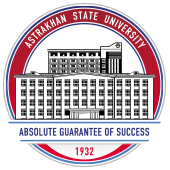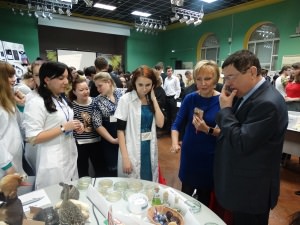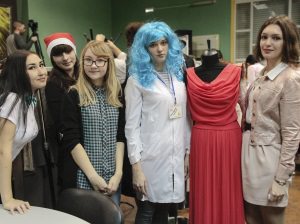Exposition of Projects of Students’ Science
 23.12.2015
23.12.2015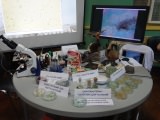
The Festival of Students’ Science was held at Astrakhan State University last week for the first time. Its most active participants have told us about their projects and impressions of this event, while management of the University has given us their expert assessments.
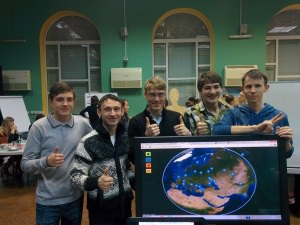 Victor Zanozin, Vladislav Ivanov (Department of Geology & Geography):
Victor Zanozin, Vladislav Ivanov (Department of Geology & Geography):
“The goal of our project “Expedition Tourism” is to integrate our students’ research activities into modern GIS technologies. Our development is a demo version: we’re planning to create a large mapping social network, where any student of ASU (and afterwards any user) could mark their favorite places, leave their feedback about their trips, and share their impressions of this or that place. Besides, we’re going to create an information interactive globe to fix travels by such famous discoverers as Vasco da Gama, Amerigo Vespucci, Christopher Columbus, and others. We hope our concept will help teach kids Geography and interest a wide range of people.
We were glad to present our projects at the Festival, as young researchers could demonstrate their achievements and find new friends and like-minded people. We’re not going to stop on what we achieved: we’re planning to implement our developments into the educational systems, for example, to apply them at experimental classes at school, to create electronic applications and maybe social geographical networks”.
Victoria Bazhan, Vladlena Sevastyanova (Department of Psychology):
“The relevance of our project “National Features of Russian Federation’s Strategically Important Partners” is due to the current geopolitical situation in the world, where negotiations act as the key and the most efficient means to resolve contradictions between countries. Our product is a political map of the world that identifies our strategically important partners. It’s supplemented with cards describing styles of behavior during the negotiation process with each of those partners.
Our project is aimed at students specializing in conflict studies, in international relations, or in the Political Science, as well as for specialists in the field of international relations, conflict studies, or business and for anyone interested in cross-cultural Psychology.
We’re planning to create an interactive teaching game jointly with the Department of Mathematics and Information Technologies.
The Festival was very useful for us. Such events help us learn more and share experience with our peers. We wish such forums became our University’s good tradition”.
Darya Vilkova (Biological Department):
“Reps of our Department demonstrated several research projects: “Development of Complex Technology to Increase Capacity & Quality of Agricultural Produce in Arid Zone”, “Development of Technology of Biological Treatment of Food Industry Salinized Sewage Water with Organism Consortium”, and so on. Guests of the Festival could take part in our quiz “Animals of Astrakhan Region”. Besides, anyone could look at the world thru a microscope ocular and see various bacteria. Our students told in details what benefit or harm each of them causes”.
Artem Dalakyan, Anatoly Syanov (Law Department):
“To demonstrate our project “Application & Development of Forensic Tools & Means for Prompt Revelation & Prevention of Crimes”, our Department provided us with all the necessary hardware to let us show how fingerprints and footprints are taken from horizontal and vertical surfaces. Both our students and University administration showed real interest in our project. Many thanks to our professors for their help”.
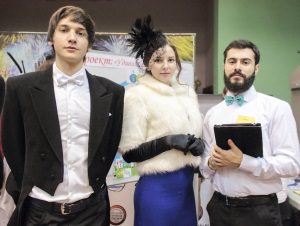 Aygul Issagalieva (Department of Social Communications):
Aygul Issagalieva (Department of Social Communications):
“Each of us faces the necessity to comply with dress code. These are not just rules to choose your clothes depending on a particular event; that’s also a way to highlight your image. Students of our Department have conducted their focus group survey “Dress Code as Factor of Successful Self-Presentation in Modern Society”. We used various innovative techniques of interactive communication with guests of the Festival. At the same time, we questioned them to find out how satisfied with the Festival they are; the obtained data were processed automatically and displayed on a multimedia screen”.
Victor Dorofeev, Chairman of the Student Research Council of ASU:
“The Festival of Students’ Science is a nonstandard scientific event: any participant could plunge into the research environment even without fundamental knowledge and have a look at the science from various angles. No doubt, the Forum was successful. Our team arranged an informal mass research event and met all the set goals. We revealed drawbacks as well; they were mainly to do with the event organization, so we’ll work hard to improve them and make the next Festival brighter and more interesting. Thanks to all the event participants and organizers for the job they’ve done!”
Professor Boris Kaygorodov, Dean of the Department of Psychology:
“The Festival is indeed essential, as it makes it possible to demonstrate the results of our students’ research activities. It motivates them, forms a competitive environment, and makes them feel a part of the research community. Our students chose their projects themselves; all their developments are of practice-oriented character. Now we’ll think how to commercialize their ideas”.
Professor Anna Romanova, Director of the Institute of Humanities:
“The Festival of Students’ Science was crucial for our students and young faculty staff members, as it made them look at many things in another way. Applied aspects of science were the backbone of this event. I think the Festival met its goals. Such forums should be held on a regular basis; maybe we should work out some other options of such activities. I wish all the participants to realize all their research ideas!”
Professor Lyudmila Baeva, Dean of the Department of Social Communications:
“The Festival impressed everyone greatly. That was a smart opportunity for our students to demonstrate their developments. Each Department could present both individual and team projects. We chose the latter way by making up a team of students who specialize in different fields. They gained experience in business communication, as they were to present a project for a wide range of visitors, who were not professionals in this field.
As for ASU itself, I think this event is just the initial stage of enhancing our overall research activities. The event met its goals well, although there were some drawbacks. Many visitors mention shortage of space, as there were very many visitors and guests. Yet, I think such a density, such a “critical mass” and a feeling that there is not an inch of room provided an extra advantage: ideas were born right at the Festival; our students felt as real scientists, which is certainly essential. Research activities are as important for our University as artistic or aesthetic ones, so we ought to develop them further!”
Professor Elena Kondratenko, Dean of the Biological Department:
“This event was very unusual and interesting, and my special thanks to its organizers for that. Student teams of our Department presented their R & D smartly. They got prepared for their presentations carefully: they cultivated microorganism strains and broadcast microscope-visible images to a large screen, so that the Festival visitors might see living organisms’ movements in the live mode. Our students also researched various types of cultured milk foods, which are sold in retail outlets, to find out which product contains the maximal amount of strains, thanks to what they could give the Festival visitors particular recommendations.
Both our professors and students assess this event highly. We wish the Day of Open Doors passed in the same format”.
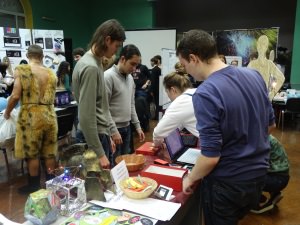 Dr. Alexey Rybakov, Director of the Institute of Researches & Solutions to Technological Tasks:
Dr. Alexey Rybakov, Director of the Institute of Researches & Solutions to Technological Tasks:
“One of the main pluses of the Festival is that it was arranged by our students. That was a splendid opportunity for them to demonstrate their research achievements not just to their professors, but also to their peers. The exhibition made it possible to look, touch, and taste the exhibits. What’s especially fine is the large audience spanned by the Festival; it favors a more profound interest towards science and researches. If compared with outcomes of a conference or a roundtable, here we can see a higher output from the hands-on point of view. Atmosphere of competition dominated the Festival: its participants tried to gain scores and present their products the best way possible. That was a communication site for our students of different years of studies, of different Departments and specializations, which is usually impossible at traditional conferences. Thanks to all the people of our Institute for the work they did!”
After the Festival, a meeting of the University administration to discuss its outcomes has been held. According to Professor Anna Fedotova, our Vice Rector for Research Activities, the large scale of the Festival has turned out to surpass any initial expectations: about 300 students have become its participants, and over 1, 500 people have visited it. As for drawbacks, the voting mechanisms did not work efficiently enough; professors of some Departments played a too active role in their students’ presentations; there was a shortage of demonstration space and technical breakdowns in the Internet access. Professor Alexander Lunyov, Rector of ASU, has analyzed the presented reports and given his recommendations to develop criteria of research projects assessment; he has advised to hold such Festivals at each of our University Institutes twice a year.
All the participating Departments have been awarded with nominee diplomas. The following projects have been recognized as laureates of the Festival of Students’ Science: “Body Harmony”, “Development of Complex Technology to Increase Capacity & Quality of Agricultural Produce in Arid Zone”, “System of Data Collection, Transmission via Radio Channel, and Signaling of Fish Biting”, “Focus Group & Monitoring Researches as Efficient Tools to Obtain Data in Live Mode”.
Let us congratulate the Festival participants on their research achievements represented at this event successfully!
Interviewed by T.Yu. Gavrilkina (University Web Resources Information Support Laboratory of ASU)
Russian original photo source: participants of the Festival
